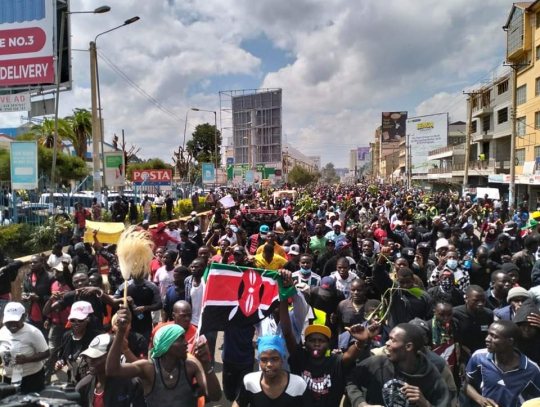#in Kenya
Explore tagged Tumblr posts
Text





Cheetah cubs feasting on kudu Taken in Maasai Mara, Kenya Photographed by Madhur Nangia
13K notes
·
View notes
Text

Redrew Kamba Miku , had one of those moments when I was like “i like this… but I can do better” so I did better lmao

#kamba miku#kenyan miku#hatsune miku in my culture#hatsune fanart#vocaloid hatsune#hatsune miku#international miku#miku worldwide#vocaloid miku#mikuhatsune#miku fanart#miku#hatsune#art#character art#miku around the world#redraw#kenya#vocaloid
6K notes
·
View notes
Text


Massive protests against the 2024 Finance Bill continue in Nairobi and across Kenya. Parliament has been stormed, and City Hall set on fire.
The bill imposes taxes that will further impoverish those already suffering from the increasing cost of living. The government even tried to put a tax on bread and cooking oil, but this was apparently withdrawn. The International Monetary Fund is putting pressure on president Ruto to impose austerity measures and raise taxes.

Supreme Court staff and lawyers helping demonstrators with water.
Some protestors have been shot, with fatalities. The police have apparently arrested a number of paramedics trying to treat the wounded.
Homes of several MPs who support the finance bill have been looted and set ablaze. I have no sympathy.
A protestor stated:
“We are the flames burning up the country. We cannot stand still while we are robbed and made poor. “This movement will not stop until we have won. They can kill us but they can’t beat down our movement.”
3K notes
·
View notes
Text
Rest in peace Roger Whittaker
1 note
·
View note
Text
33-year-old Ugandan marathon athlete Rebecca Cheptegei, who competed in this summer's Paris Olympic Games, has been killed by her ex-boyfriend. He doused her in petrol, set her on fire and burned her alive when she came back from church with her two daughters.
Gender-based violence is a major concern in Kenya, where Cheptegei lived and worked. In 2022, at least 34% of women in Kenya said they had experienced physical violence, according to a national survey.
Her death comes after the killings of fellow East African athletes Agnes Tirop in 2021 and Damaris Mutua in 2022, with their partners identified as the main suspects in both cases by the authorities.
Our thoughts are with her family, who are left without their loving relative and the family's main breadwinner.
#rebecca cheptegei#olympic games#sports#sports news#femicide#death tw#feminism#💬#uganda#kenya#marathon
1K notes
·
View notes
Text

A white-backed vulture (Gyps africanus) sits on a hippo skull in Maasai Mara National Park, Kenya
by praveen pandian
#white backed vulture#animal death#vultures#raptors#birds#gyps africanus#gyps#accipitridae#accipitriformes#aves#chordata#wildlife: kenya#wildlife: africa
2K notes
·
View notes
Text
femme☆phenomenon One Of Those HetaGirls is out now!

The leading ladies of Hetalia are officially taking their spotlight!
femme☆phenomenon One Of Those HetaGirls is a showcase of writing and fanart bringing love to our women cast of characters for International Women's Day 2025! For this first edition, we had the guiding theme of flora and fauna.
May our beloved HetaGirls receive all the love and adoration they deserve! Happy International Women's Day to Ancient Greece, Ancient Egypt, Belarus, Belgium, Czechia, Hungary, Kenya, Liechtenstein, Monaco, Seychelles, Taiwan, Ukraine, Vietnam, Wy, and Zimbabwe!
You can view and download the zine: HERE!
@hetaliahappenings @hetaliacalendar @heta-on-the-books @nsfhetalia @fuckyeah-hetalia
#hetalia#hetalia zine#fanzine#hetagirls#hws ancient egypt#hws ancient greece#hws belarus#hws belgium#hws czechia#hws hungary#hws kenya#hws liechtenstein#hws monaco#hws seychelles#hws taiwan#hws ukraine#hws vietnam#hws wy#hws zimbabwe
461 notes
·
View notes
Text
"The struggle to keep one of the world’s largest and rarest antelope species alive has taken a massive step forward in Kenya.
17 mountain bongos have been flown to Kenya from the Rare Species Conservation Center in Florida for eventual reintroduction into their natural habitat.
A subspecies of bongo, the largest of the forest-dwelling antelope, the eastern, or mountain bongo, numbers less than 100 individuals, and is listed by the IUCN as Critically-Endangered. More survive today in zoos than in the wild.
The history of the animal is an interesting one, as it’s believed to have become a forest species when climate change turned savannah areas into forests thousands of years ago. In the case of the mountain bongo, their home range is located in southern Kenya, on the slopes of Mount Kenya National Park and in the surrounding woodland.
They are the world’s third-largest antelope species behind the giant eland and common eland.

Pictured: Female mountain bongo (Tragelaphus eurycerus isaaci) photographed at Mount Kenya National Park.
Tourism Minister Rebecca Miano described the arrival of the bongos at the country’s main airport on Sunday night as “emotional and so cool.”
The animals will first be kept in an acclimation center run by the Kenyan Wildlife Service (KWS) that will protect them while they re-hone their instincts for wild living.
Within three months, the BBC reports, the KWS will be welcoming another shipment of these bongo from captive breeding programs across Europe.
The last time a large shipment of animals like this made it to Kenya was in 2004, when 18 animals arrived safely. They successfully integrated with the wild population, and though some died of tick-borne diseases, it demonstrated that captive animals can successfully make it in the wild if given time and training."
-via Good News Network, February 26, 2025
#antelope#bongo#endangered species#conservation#wildlife#animal photography#wildlife photography#wild animals#wildlife conservation#kenya#africa#good news#hope
632 notes
·
View notes
Text



Mama and cubs Mara Plains Camp, Kenya Photographed by Suzi Eszterhas
6K notes
·
View notes
Text
January 28, 2025 - Protesters in Kinshasa, Democratic Republic of the Congo, set fires at the embassies of France, Belgium, Rwanda, Uganda, Kenya and the United States, chanting slogans like "Thieves, get out!". The protesters targeted the embassies of countries they accuse of complicity with Rwanda and the M23 militia.
Rwanda supports the M23 militia that is currently taking over the resource-rich eastern part of the country. And of course Belgium and the USA have been involved in destabilizing DR Congo since its' independence in 1960, to plunder the country's vast mineral resources. [video]/[video]/[article]
#dr congo#congo#kinshasa#embassy#fire#france#belgium#rwanda#kenya#usa#anti-colonialism#anti-imperialism#2025#m23#video#democratic republic of the congo
881 notes
·
View notes
Text

jumping on the trend with Kamba Miku :3
#hatsune miku#vocaloid#vocaloid hatsune#hatsune fanart#my culture#kenya#hatsune miku in my culture#miku worldwide#miku#vocaloid miku#miku fanart#mikuhatsune#kenyan miku#international miku#international#culture
1K notes
·
View notes
Text



also my take on kenya for funzies
#i lowkey felt bad yaoifying my peoples colonizer so this was to appease my ancestors#hetalia#aph kenya#hws kenya#aph england#I know there's already like a semicanon design for her but I do what I want#my Kenya bracelet lowkey burns me when I draw england.#this is me repenting#aph#hws
441 notes
·
View notes
Text





Os Outros 2x08 (2024)
602 notes
·
View notes
Text

Father and child in Lamu, Kenya © Eric Lafforgue
#Lamu#Lamu Island#Kenya#Africa#documentary photography#Father’s Day#african photography#travel africa
2K notes
·
View notes
